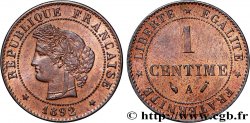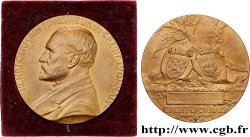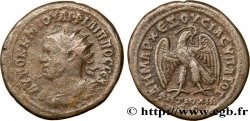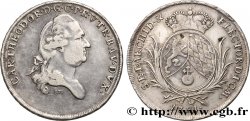Not available.
Item sold on our e-shop (2016)
Price : 125.00 €
Item sold on our e-shop (2016)
Price : 125.00 €
Type : Médaille du Sénat à Charles Simon
Date: 1888
Mint name / Town : 75 - Paris
Metal : silver
Diameter : 50,5 mm
Orientation dies : 12 h.
Engraver BOURGEOIS Léon Max (1839-1901)
Weight : 67 g.
Edge : lisse + corne BRONZE
Coments on the condition:
Jolie médaille avec une patine sombre, un peu tachée au revers
Obverse
Obverse legend : RÉPUBLIQUE FRANÇAISE.
Obverse description : Marianne à droite, coiffée du bonne phrygien ; une branche de lauriers derrière la nuque. Signé : LEON MAX BOURGEOIS.
Reverse
Reverse legend : SÉNAT / CHARLES / SIMON / SECRÉTAIRE RÉDACTEUR / 1888.
Reverse description : Légende en 5 lignes dans un cartouche circulaire, entouré d’une couronne mêlée de chêne et de lauriers.
Commentary
Monogramme MB au revers, pour le graveur Léon Max Bourgeois. Les productions de Max Bourgeois sont souvent associées à l’Assemblée nationale, au Sénat, sans que sa biographie n’ait laissé de grandes traces...
Charles Simon est un dramaturge et haut fonctionnaire français, né Charles Eugène Suisse, le 8 juillet 1850 à Paris et mort en 1910.Charles Simon est le fils de Jules Simon, écrivain et homme d'État français, président du Conseil en 1876-77.
Lors de la Guerre franco-prussienne de 1870, Charles Simon est sous-lieutenant dans un bataillon de marche de la Garde nationale, et prend part au combat de la redoute de Montretout. En 1875, il est nommé secrétaire-rédacteur au Sénat, puis chef du secrétariat du Sénat. En 1876, il est chef de cabinet de son père, alors ministre de l'intérieur et président du Conseil. Aux élections législatives du 14 octobre 1877, candidat à Castres, il est battu par le député monarchiste sortant.
Journaliste, il collabore en 1872 au journal d'Edmond About, Le XIXe Siècle, aux côtés notamment de Francisque Sarcey. En 1878, il crée à Lille avec son frère Gustave Simon le journal Le Petit Nord3. Les deux frères fondent ensuite à Paris Le Petit Bleu, journal parlementaire hebdomadaire, actif au moment de l'affaire Dreyfus.
Dans les années 1890, Charles Simon se lance dans l'écriture théâtrale. Il écrit, en collaboration puis seul, plusieurs pièces, dont l'une, Zaza, créée en 1898 et interprétée par Réjane, remporte un vif succès.
Charles Simon fut secrétaire général du syndicat des auteurs et chevalier de la Légion d'honneur..
MB monogram on the reverse, for the engraver Léon Max Bourgeois. Max Bourgeois's works are often associated with the National Assembly and the Senate, without his biography having left much of a mark.. . .
Charles Simon was a French playwright and senior civil servant, born Charles Eugène Suisse on July 8, 1850 in Paris and died in 1910.. Charles Simon is the son of Jules Simon, French writer and statesman, President of the Council in 1876-77.
During the Franco-Prussian War of 1870, Charles Simon was a second lieutenant in a marching battalion of the National Guard, and took part in the battle of the Montretout redoubt.. In 1875, he was appointed secretary-editor to the Senate, then head of the Senate secretariat.. In 1876, he was chief of staff to his father, then Minister of the Interior and President of the Council.. In the legislative elections of October 14, 1877, as a candidate in Castres, he was beaten by the outgoing monarchist deputy.
A journalist, he collaborated in 1872 on Edmond About's newspaper, Le XIXe Siècle, alongside Francisque Sarcey in particular.. In 1878, he created the newspaper Le Petit Nord in Lille with his brother Gustave Simon3. The two brothers then founded Le Petit Bleu in Paris, a weekly parliamentary newspaper, active at the time of the Dreyfus affair..
In the 1890s, Charles Simon began writing plays.. He wrote, in collaboration and then alone, several plays, one of which, Zaza, created in 1898 and performed by Réjane, was a great success..
Charles Simon was secretary general of the authors' union and knight of the Legion of Honor.
Charles Simon est un dramaturge et haut fonctionnaire français, né Charles Eugène Suisse, le 8 juillet 1850 à Paris et mort en 1910.Charles Simon est le fils de Jules Simon, écrivain et homme d'État français, président du Conseil en 1876-77.
Lors de la Guerre franco-prussienne de 1870, Charles Simon est sous-lieutenant dans un bataillon de marche de la Garde nationale, et prend part au combat de la redoute de Montretout. En 1875, il est nommé secrétaire-rédacteur au Sénat, puis chef du secrétariat du Sénat. En 1876, il est chef de cabinet de son père, alors ministre de l'intérieur et président du Conseil. Aux élections législatives du 14 octobre 1877, candidat à Castres, il est battu par le député monarchiste sortant.
Journaliste, il collabore en 1872 au journal d'Edmond About, Le XIXe Siècle, aux côtés notamment de Francisque Sarcey. En 1878, il crée à Lille avec son frère Gustave Simon le journal Le Petit Nord3. Les deux frères fondent ensuite à Paris Le Petit Bleu, journal parlementaire hebdomadaire, actif au moment de l'affaire Dreyfus.
Dans les années 1890, Charles Simon se lance dans l'écriture théâtrale. Il écrit, en collaboration puis seul, plusieurs pièces, dont l'une, Zaza, créée en 1898 et interprétée par Réjane, remporte un vif succès.
Charles Simon fut secrétaire général du syndicat des auteurs et chevalier de la Légion d'honneur..
MB monogram on the reverse, for the engraver Léon Max Bourgeois. Max Bourgeois's works are often associated with the National Assembly and the Senate, without his biography having left much of a mark.. . .
Charles Simon was a French playwright and senior civil servant, born Charles Eugène Suisse on July 8, 1850 in Paris and died in 1910.. Charles Simon is the son of Jules Simon, French writer and statesman, President of the Council in 1876-77.
During the Franco-Prussian War of 1870, Charles Simon was a second lieutenant in a marching battalion of the National Guard, and took part in the battle of the Montretout redoubt.. In 1875, he was appointed secretary-editor to the Senate, then head of the Senate secretariat.. In 1876, he was chief of staff to his father, then Minister of the Interior and President of the Council.. In the legislative elections of October 14, 1877, as a candidate in Castres, he was beaten by the outgoing monarchist deputy.
A journalist, he collaborated in 1872 on Edmond About's newspaper, Le XIXe Siècle, alongside Francisque Sarcey in particular.. In 1878, he created the newspaper Le Petit Nord in Lille with his brother Gustave Simon3. The two brothers then founded Le Petit Bleu in Paris, a weekly parliamentary newspaper, active at the time of the Dreyfus affair..
In the 1890s, Charles Simon began writing plays.. He wrote, in collaboration and then alone, several plays, one of which, Zaza, created in 1898 and performed by Réjane, was a great success..
Charles Simon was secretary general of the authors' union and knight of the Legion of Honor.







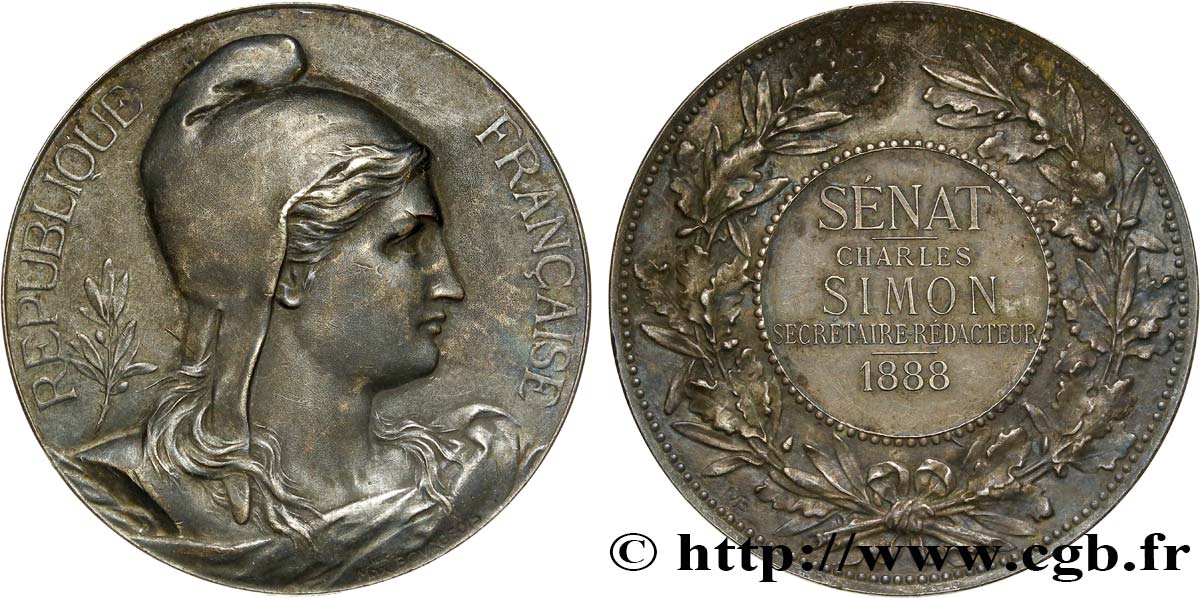
 Report a mistake
Report a mistake Print the page
Print the page Share my selection
Share my selection Ask a question
Ask a question Consign / sell
Consign / sell
 Full data
Full data